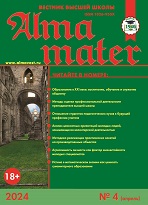https://doi.org/10.20339/AM.07-17.033
Zh.S. Safronova is Cand.Sci. (Pedagogy), doc.; D.S. Brazevich is Cand.Sci. (Sociology), doc.; and I.I. Tolstikova is Cand.Sci. (Philosophy), doc., head of sub-faculty at Saint Petersburg NRU of Information Technologies, Mechanics and Optics e-mail: brazevich1986@mail.ru
Discussed are problems of ethno-social adaptation of migrants, and also ways of solution of such in modern mega-polis. Substantiated is that successful ethnosocial adaptation is condition of welfare of society. Given is definition of ethno-social adaptation as the process of and result of active adaptation of individual in conditions of ethno-social and national environment. Presented are results of research work of in ethno-social adaptation of Tajik and Turkmen students in conditions of the city of Saint Petersburg. Defined are character universal and specific peculiarities of ethno-social adaptation of Tajik and Turkmen students, conditioned by national character. Analyzed are principal stages of the program of ethno-social adaptation of students from Central Asia, i.e. educational, interactive, consult. Presented is a number of methods for realization of the program. Also noted are perspective direction in solving of ethno-social problems.
Key words: ethno-social adaptation, national orientation, social wellbeing, culture, stereotypes, conflictogenity, social uneasiness, justice, sociability, conflict, program, positive perception, informal communication, personal qualities, authority, people of Central Asia.
References
1. Beznosov, D.S., Pochebut, L.G. Psychological aspects of extremism and terrorism. Bulletin of St. Petersburg University. Series 12 “Sociology”, 2010.
2. Goncharenko, L.V. Ethnocultural environment of the metropolitan mega-policy: migration dynamics and national composition. In: Modern problems of science and education. URL: http://www.science-education.ru/en/article/view?id=13279
3. Gurieva, S.D. Psychology of interethnic relations: Author’s abstr. diss. (Dr.Sci. Psychol.). St. Petersburg, 2010.
4. Erokhina, E.A. “Locals” and “newcomers”: ethnic border and interethnic interaction in modern Russian megalopolis. Knowledge. Understanding. Skill. 2011.
5. Efremova, M.V. Acculturation Expectations and Installation with Respect to Migrants of the Receiving Population of the City of Moscow. Almanac of Modern Science and Education. 2012.
6. Nazarov, R.R. Personality in the system of ethnic culture (on the example of the peoples of Central Asia). Future Human Image. 2014.
7. Primakov, V.L. Poly-cultural education as the basis for the prevention of youth extremism in the field of ethnoconfessional relations. Sociology of Education. 2016.
8. Ryabinchenko, T.A., Lebedeva, N.M. Attitude to immigration and subjective welfare of host population. Social Sciences and Modernity. 2014, no. 2, pp. 34–45.











.png)






